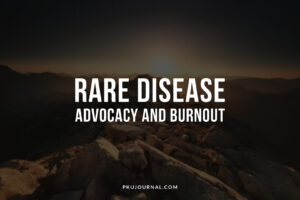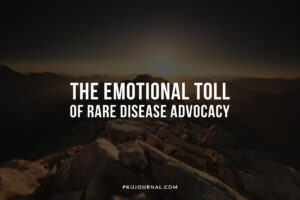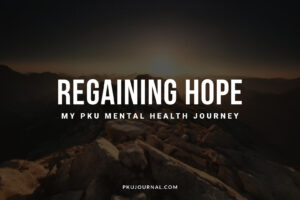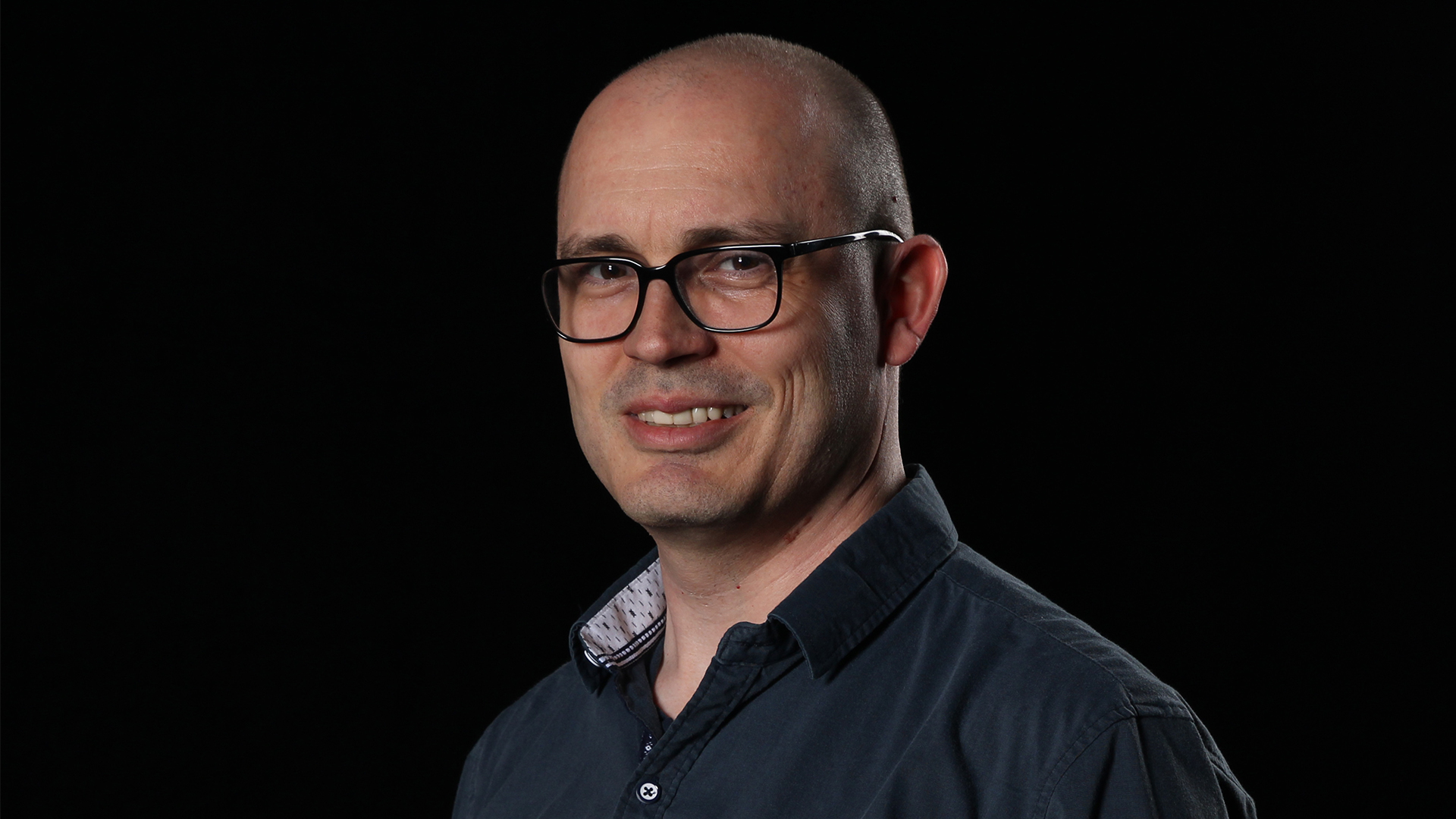Friendship heals broken hearts. And it’s the best part about engaging in PKU or rare disease advocacy. If you open yourself up to the possibility, you can develop some meaningful friendships with those who understand you.
The Healing Power of Friendship
The rare disease life is a lonely life. The isolation you feel can be overwhelming. I can only speak from my experience as someone who grew up with a rare disease. I recognize that many in the rare disease community are parents & caregivers. Others weren’t diagnosed until later in life after enduring their diagnostic odyssey. But I think there are universal themes that affect us all.
PKU was the first rare disease detected through newborn screening (for more about the history of PKU, check out this story). The treatments have been around for a long time, and so many of us are now adults, thriving in our lives and careers. I want to see the same story happen with other rare diseases.
Yes, we still have our challenges in the PKU community, especially getting access to our prescribed medications. But, PKU is on the Recommended Uniform Screening Panel for newborn screening (see this story for an update on RUSP in 2025), there are established treatments, a variety of medications, and children grow up, become adults, and live their lives, despite the daily grind of managing this rare disease. That, to me, is a successful progression of treatment and care of a rare disease.
Our work isn’t finished. We are fighting hard for equal access to the established treatments and medications. And we are determined to find a cure. But we have made a lot of progress. And everyone in the rare disease community… everyone… deserves that same chance.
But, back to my perspective as someone who grew up with a rare disease. PKU has been part of my identity since birth. Actually, I think it’s formed the core of my identity. It’s such a central part of who I am and how I view the world.
There’s something about growing up with a rare disease. You feel like an outsider. Everywhere. All of the time. Even as a kid, you realize that you are very different. And because my rare disease is a metabolic disorder, that’s especially true any time I sit down to eat with others.
Most people take it for granted, but eating is one of the most social activities in life. Holidays. Lunch meetings. Superbowl parties. Press conferences (well, the good ones anyway).
When people gather for a social event, often there is food. But when your food choices are extremely limited, what goes on your plate… or doesn’t… often becomes the subject of conversation.
On one hand, the conversations are harmless. Most of the time, people are curious to learn about this special diet. As an advocate for PKU awareness, I lean into that now. I take the time to explain PKU.
But still, even to this day, even though my diet is more flexible now thanks to medications now available in our community… I still feel like an outsider. I don’t think that feeling will ever go away, because it’s followed me since birth.
When I was younger, feeling like an outsider all of the time developed a sense of shame in me. That feeling that there is something inherently wrong with who I am.
But, over the years, as I’ve traveled the world and met others just like me, I’ve learned that one of the best ways to fight back at shame… is to know that I am not alone.
My First Speech About PKU
I was nervous. I had never given a speech before. And now, here I was, preparing to speak about my rare disease… PKU. I was in middle school, and for some reason my elective was public speaking. Whose bright idea was that? At the time, I would rather have jumped out of a moving car than speak in public.
I was a shy kid. Most of the time, I was in my own little world. I’d rather daydream about being Luke Skywalker or Indiana Jones than do… well, just about anything. I loved stories. But especially I loved movies. No matter what movie I watched, afterward I would want to act it out. I mean, who wants to watch Batman when you can just be Batman?
But as I got older, life started to chip away at that spark. Because as I got older, the differences between me and others… because of my rare disease… became very evident.
And so, I found myself… this shy kid with a growing lack of confidence, preparing to speak about something I should have been extremely confident about. Something I’ve lived with since birth. Something I’ll carry with me for the rest of my life.
I was at a new school, and had been going there for a few years. But I never seemed to shake the reputation as the new kid… or at least, that’s the way I perceived it. I already felt like an outsider because of PKU. But then suddenly I was in this environment where everything about me felt wrong.
The worst thing ever was being different. And I was very, very different.
So, when I stood up to give my speech, I was more than a little nervous. I felt every eye on me… because I always felt every eye on me.
I don’t remember exactly what I said that day, at least not during the speech itself. But I’ll never forget the Q&A. When one of the kids in class asked what would have happened if I wasn’t diagnosed with PKU at birth, I answered truthfully. I said, “I wouldn’t have been put on treatment, and I would have been institutionalized. For life.”
The classroom burst into laughter.
I tried to play it cool. But the message I received was clear: everything about you is wrong.
Difference is Beautiful
Of course, now I look back on that event 30 years later with a different perspective. Often, people don’t know how to accept those who are different. That’s not the way things should be, but it’s the way they are. And, they were just kids. I’m sure they have no memory of that event. But clearly, that moment has stuck with me.
Most of those kids were just good kids who didn’t know how to accept someone different. But some of those kids, at least a few, were just bullies.
I have no patience or tolerance for bullies. I consider myself an easygoing person, and rarely become truly angry. I try to find a point of commonality and can get along with almost anyone. But bullying is where I draw a clear line in the sand. No one should be mistreated for any reason, and especially not for the way they are… the way they were born.
Maybe it’s because I was bullied. I just know that, to this day, I refuse to be friendly toward anyone who bullies. It scars people for life, and makes them start to believe, “Maybe I am wrong.”
That’s the destructive power of shame.
It took me a little over 30 years to even begin to feel comfortable with who I am. And that’s because I began meeting others in the PKU community, people who understand that being different isn’t wrong. It just means that I don’t see the world the same way as many people do. Now I consider that a strength, not a weakness.
Friendship Is the Antidote to Shame
I’m starting to believe that one of the antidotes to shame is friendship. Real friendship. There is immense value in two people saying to each other, “You are good enough.” We don’t always say it in words, but by being someone’s friend we say it in actions.
I had a few friends at that school. But I didn’t really come into my own until later in high school. I found a group of guys who were outsiders like me. Nerds before it was cool to be nerds. They were all in my wedding. The kind of friends you can go years without seeing, but when you get together it’s like no time has passed.
We’re still the same nerdy nineties teens who love to text each other Star Wars memes. Those friends taught me how it feels to be accepted for who you are. They never made me feel weird for having PKU. Everyone has a “thing” and PKU is just my thing.
But there was one thing I was still missing. I didn’t know anyone else with PKU.
Living with PKU, or any rare disease for that matter, was a different experience before social media. My parents were completely isolated in their experience of raising a child with PKU. We only knew of one other family, and they were happy going it alone. So I knew no one affected by PKU.
Until one day when I went to genetics clinic and struck up a conversation with someone. She was the mom to a five-year-old boy with PKU. He was the first person I ever met who shared my rare disease. When I produced a short documentary about my life with PKU, I interviewed them both.
I interviewed my friend Will Singletary for “My PKU Life”. He was six at the time. He’s now in college. He was the first person I ever met with PKU. I’ve interviewed him a few more times over the years. Watching him grow up and become an amazing adult has been one of the greatest joys of my advocacy journey.
After I posted “My PKU Life” to YouTube, I connected with others affected by PKU on Facebook. And for the first time in my life I talked with other people who got it. It didn’t matter that I was in the US and they were in the UK, or Australia, or Italy, or Brazil, or Russia. Our specific circumstances might be different, like how much protein we could consume or the way we approached treatment. But there was a common thread of loneliness.
We had grown up, or raised kids, in social isolation. And now, social media was just beginning to take off. And for the first time in our lives we didn’t feel alone.
Invitations to speak at events around the world came in. And I began meeting others in person. And that was a totally different experience.
I think all of us, after COVID, now understand the value of in person, face to face conversations. I don’t think I’ll ever take that for granted again. But those days, early in my PKU advocacy, of traveling and meeting others face to face, and having real conversations about life with our rare disease… it was just such a special time.
I couldn’t believe the gift life had presented me. I was combining my career in storytelling with PKU advocacy. And my heart felt full.
Drowning Out Shame
Those in-person events are now such an important part of my life. In the summer of 2022, the National PKU Alliance held the first in-person conference since COVID. Because of other commitments, I had missed the previous conference in 2018. So, it had been 6 years since I had been to one.
I reconnected with friends I hadn’t seen in years. Others… well, we had been friends on social media for years. But it was the first time we met in person.
Still, after all these years in advocacy, it never gets old… meeting someone in person you’ve only known on social media. That shared experience of the rare disease lifestyle is what bonds you. You feel like you’ve known each other forever.
And when you meet those you’d feel like you’d be friends with even if it weren’t for your rare disease… well, that’s even better.
The friendships I’ve made in the PKU community are now some of my most cherished friendships.
We all face the same fight every day against a rare disease we’ll carry for life. We all understand the isolation. And many of us are involved in PKU, newborn screening, and rare disease advocacy.
I’m learning that it’s those friendships… those relationships with people who get it… that is how I fight back against shame.
Shame tells you that you aren’t good enough. That you are inherently wrong. But engaging with friends, having meaningful conversations about life, and being united in a cause… all of that drowns out shame. By being in relationships with others, by no longer being isolated from the rest of the world.
You slowly begin to realize… I am good enough. My uniqueness is a strength. I have something valuable to contribute to the world.
Sometimes all we need is someone to believe in us. And someone else to believe in.
My friends are the most precious thing in the world to me. That may sound like a cheap cliche, but it’s true.
When I worked in the field as a TV photojournalist, I saw many people in pain. I saw a lot of death. Over and over and over. After awhile you get numb to it. But I was always terrified that it would be someone I knew.
So I started worrying about my friends and family. Constantly. I still do to this day.
I worry about my friends all of the time. Their health. Their safety. Something big happens in LA or New York, Houston, Chicago… wherever… any city, big or small… immediately I think about who I know there and if they are OK.
I care deeply about my friends because I’ve seen people die, couldn’t do anything about it, and so now I just want to know my friends are OK. That, at the very least, they know that I value our friendship.
The greatest compliment I can ever give someone is to call them “my friend”. It’s my way of saying that they have contributed to my life. That they matter to me. That I care for their well-being.
If you’re listening to this podcast, chances are you’re already connected to the rare disease community. But if not, reach out to those affected by your own rare disease. Or reach out to the wider rare disease community. Reach out to me. My social media info is in the description of this podcast.
Just reach out to someone. Don’t try to do this rare disease life on your own.
And never, never, never give up.











Leave a Reply